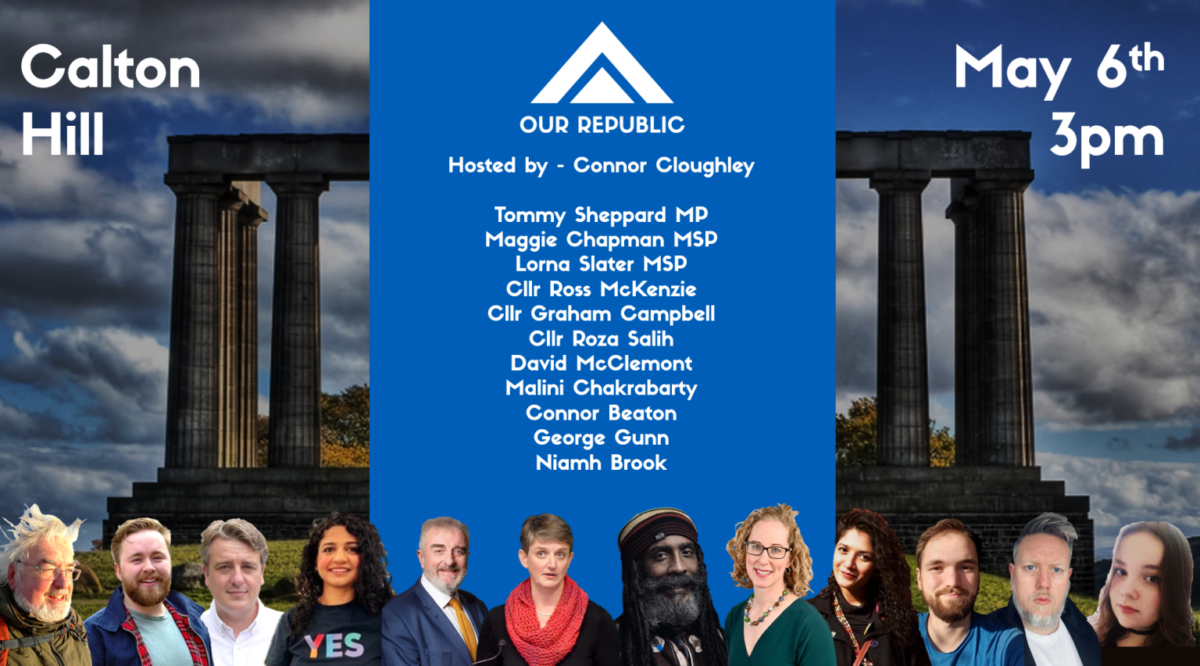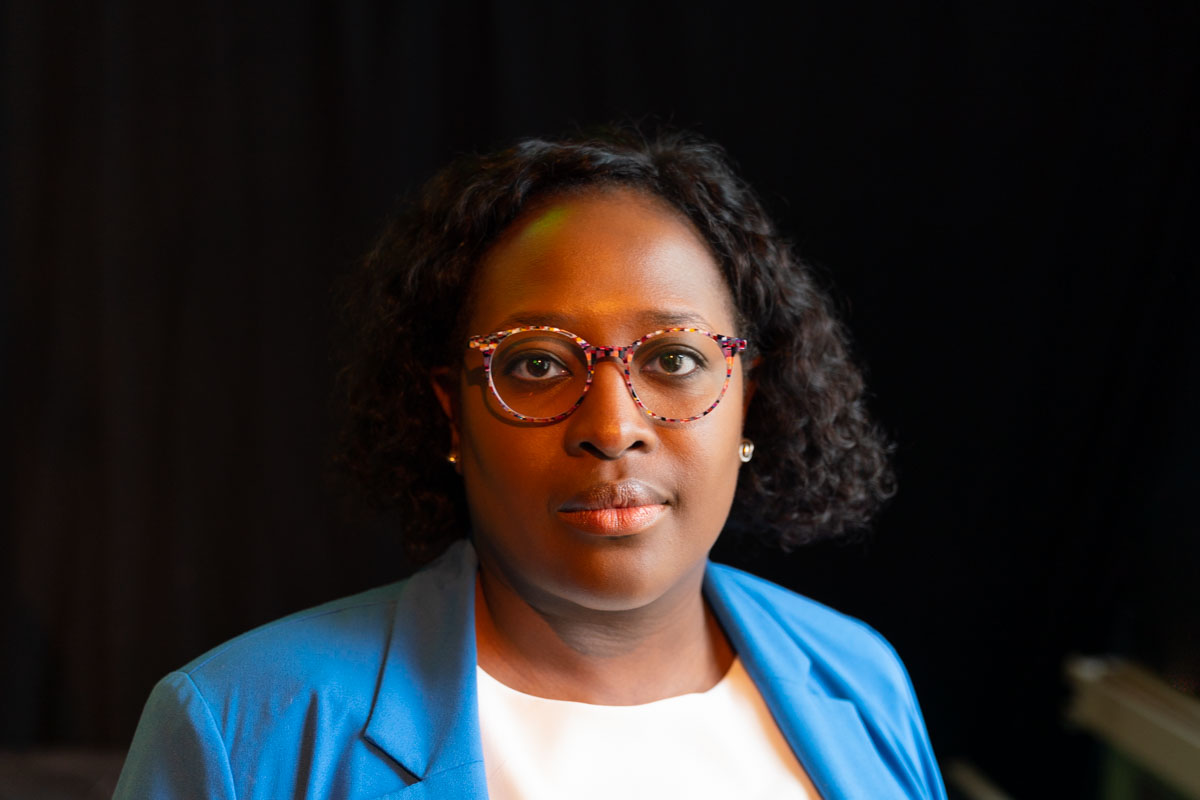Do we all agree that we need a monarchy?
As we approach the Coronation, some in Scotland have been considering the alternatives to monarchy and unelected heads of state.
One of those groups is Our Republic, (the Scottish campaign for a Republic) who are holding a rally on Calton Hill on Saturday afternoon challenging the Coronation and proposing an elected Head of State who is accountable to the people, and who might replace the unelected head of state, the King.
Speakers will include Tommy Sheppard MP for Edinburgh East, Lorna Slater Lothian MSP, and independent Edinburgh councillor, Ross McKenzie.

Another group considering the future of the monarchy is the Scottish Green Party which held a discussion event recently demanding a national debate about the issue.
With a one-sided audience there was good-natured discussion among people with the same view at the event held in Summerhall. It was a party event convened by the “only pro-republican party in The Scottish Parliament”.
John Hall who is Treasurer of Our Republic, was a member of the panel. He explained what he believes needs to be done after saying that Our Republic had basically begun with conversations on Twitter during lockdown. These were not party political conversations but a group of like-minded people wanting to talk about possible change. And now the organisation is trying to talk more about the possibility of a republic and also how to bring it about – which he said is not easy in a country with an “uncodified constitution”. One of the first things the group has tried to do is get rid of any need for swearing allegiance to the monarch on entering parliament, but it turns out that is reserved to Westminster and The Scottish Parliament cannot make the change at all.
Hall said: “How do we get people active? There are two things that you need to do. The first one is that you need to talk about it, you need to share these ideas, you need to go out there and talk to people. And that is the first way in which you activate yourself – you go out to the rallies, like the rally on May 6th at 3pm on Calton Hill.
“But also, you just get involved, come talk to Our Republic, make sure that people in the Green Party know that you care about this issue, make sure that you vote on these issues, make sure that you talk about these issues, and you bring them to the surface in meetings.
“That way people know that it’s important to you, and when they know it’s important to you they act on it, that’s how you activate your elected representatives.
“And the second is we need to make sure that we’re talking about ways in which we’re moving forward. We need to start the process of moving forward, we need to be asking the questions, we need to be holding our elected representatives to account to answer these questions.
“And we do that by making a lot of noise and talking about it and activating the channel and attending rallies and making them aware that it is important.”

Assa Samaké-Roman is a French citizen and journalist. She was also on the panel, saying she found the idea of a monarch “quite strange”. She said: “The fact that someone was just born in the right place, has immense wealth, immense privilege, and is supposed to represent a whole nation, I find this very problematic. I think this is when I think about what it means to be a citizen of a republic. I think that we have this collective consciousness that we are, what binds us is the fact that we are political people, we make decisions together as citizens and the people we elect as head of state, they’re one of they are supposed to be one of us, but just one citizen, they don’t sit above us, and we have no deference towards them.
“One of the lame arguments in favour of the monarchy is, you know, it’s, it’s a sign of stability, it’s continuing the stability, and I’m thinking having lived in the same country in the past five or more years, it is very unstable.”
She urged more of a party atmosphere in the movement towards a republic with “optimism and joy” to make this a successful protest.
Asked who she would choose as a president she said: “I’ve always thought in my wildest dreams, it could be Jackie Kay. I love that woman – she is one of the reasons I love this country so much. She has a sense of humour and of course was chosen as Makar.”

Patrick Harvie Green MSP said that both he and Lorna Slater as government ministers had been offered tickets for the Coronation in London which they have declined.
He said: ” I told them I was washing my hair…” He also explained that as ministers they had both agreed to abide by the ministerial code which prevents them, for example, from either confirming or denying that the monarchy has written to The Scottish Government trying to influence a piece of legislation. He admitted it may not happen as often as people may think, but it is the fact that it is secret and unaccountable that he feels leads to mistrust.
He also questions the King’s true environmental stance when he relies on aviation while conducting the business affairs of the Royal Family and at the same time making speeches about climate change.
And Harvie held up the example of the Irish president Michael D Higgins addressing The Scottish Parliament so eloquently as an opportunity that the UK is missing out on. Monarchs cannot speak politically about matters, and neither can the Irish president. But Patrick narrated how the president engaged the MSPs in the audience and talked about the possibility of transitioning to a stable society in a very powerful speech. And he said this contrasted badly with a speech made by The Queen at the Opening of Parliament the next again week in which there was no substance at all.
He continued: “I do not wish ill on people as individuals. But Charles is in his mid seventies. He is going to be in this office for some time, but nowhere near as long as the last monarch. His son will be monarch for a longer period of time. But we have this window between the Coronation and the next succession. I think that gives us a window of opportunity to be talking – not just because he is less popular than Elizabeth was – but because there is a sense of change. If change is on the agenda we should be able to shape that change.
“The idea that the the UK’s, current political status quo is so fragile so incompetent in itself that it needs to wrap itself up in all of this pomp and ceremony and, and propaganda, I think tells us something about the fact that it is not as permanent as it pretends to be.
“All we need is to know that we have permission to discuss this, to debate this and to decide this question. I think increasingly, the idea of those dwindling cohorts who do line the streets when the monarchy passes or when the Royal Family are in town, I think they will increasingly feel like a remnant of a bygone era, an era that probably shouldn’t be much missed. I think this change is likely to come about during the lifetimes of the people in this room.
“I think we have the responsibility not just to bring that about but to shape it and decide what kind of shape it is going to be and what will constitute us as a genuinely democratic society in the future.”
Asked who he would propose as a president along the model that they adopt in Ireland where Michael D Higgins holds the office, he said he would agree with the selection of Jackie Kay. But jokingly he said he always “crowbars” a reference to Doctor Who into any speech. He suggested that when Ncuti Gatwa steps down as Doctor Who he could become the President of Scotland. But he would also like to hear about possible candidates who have their roots in their communities rather than people with a political background.

Green MSP, Lorna Slater, chaired the meeting. Ms Slater is originally from Canada which is a constitutional monarchy with the British sovereign as head of state. The country remains one of the 16 members of the Commonwealth and if the monarchy was to be removed as head of state then all 10 provinces would have to agree.
The Scottish Greens are clear that as a party they do not think the monarchy should be allowed to continue (and that the House of Lords should be abolished). Both Ms Slater and Maggie Chapman MSP will address the rally on Saturday.
Ms Slater introduced the event by asking some pertinent questions. She said: “In the context is enormous wealth ever harmless? Is vast wealth harmless? Can we afford billionaires? I am of the opinion that it is harmful, that it creates a distortion in the power dynamic, that it distorts democracy.
“You cannot have vast wealth and an effective democracy living side by side because people with vast wealth can distort that democracy. Especially if they are the monarchy who have special privileges and who can write letters to the government.
“For this one family their role is determined by their bloodline, and we treat the rich differently.”
Ms Slater continued: “This is clearly an idea whose time has come. There is a clearly an appetite for this conversation clearly among young people. I think we as a party can be bolder about having the conversations about the harms caused by the monarchy. We are the party of the environmentalist, but also equality, democracy and sustainability are part of our value system.
“And one of the most exciting things about Scottish independence is that we get the opportunity to look at our constitution. But the UK with an unwritten constitution does not allow us that opportunity.”

Maggie Chapman MSP said: “We talk about living in a democracy – indeed many people think we do. But the reality does not reflect that: the UK does not elect its head of state. There are no processes for accountability for those who find themselves in positions of privilege and power simply by accident of birth.
“We should elect our leaders, and they should always be accountable to the people – the citizens – they serve. Having an unelected head of state who reigns over their subjects is totally incompatible with this principle.
“The polls show an overwhelming indifference, with more and more people questioning why we need this extravagant and archaic form of governance. We can do much better. We can have a Scottish republic built on the principles of equality, solidarity and liberty, and that embraces diversity and peace.
“Throughout the Commonwealth there are countries starting to plan for a post-monarchy future. I hope that an independent Scotland can do the same.”
Homage of the People
Everyone on the day of the Coronation is invited to join in the new Homage of the People by saying either to themselves or out loud at the appointed time (when invited by the Archbishop of Canterbury to do so): “I swear that I will pay true allegiance to Your Majesty, and to your heirs and successors according to law – so help me God.”
In the order of service there is a point at which the Archbishop will then say “God Save the King” and all are asked to reply “God Save King Charles. Long Live King Charles. May the King live forever.”
The Coronation of King Charles III is costing the UK taxpayer an estimated £100 million.
Will you be swearing allegiance? Do let us know in the comments below.




